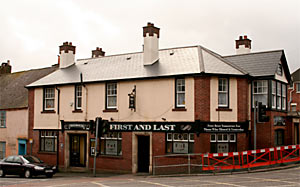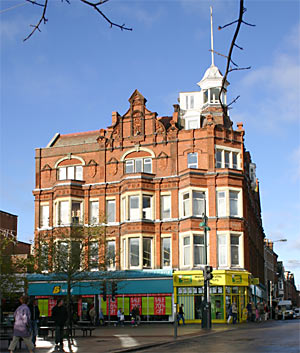
Exeter Stories
Exeter folk and friends in their own words - 1890's to the 1990's │ << Previous story │ Next story >> │
Margaret Ball - St Thomas in the 1920's
If you had strolled up Dunsford Hill in the nineteen twenties, you would have passed an old cob cottage on the left. It was known as Fanshawe Cottage. The garden was filled with lavender, mignonette, love-in-a-mist and forget-me-nots. It had been condemned as unfit for human habitation, but the landlord was persuaded to let it again at eight shillings and sixpence a week. It was primitive. There was no indoor water supply, only a cold water tap outside the back door. The lavatory was a small wooden hut in the garden. The only heat came from a small black range. There was no electricity. The cottage was lit by an oil lamp with a glass chimney which ''smeeched'' if the wick was turned up too high.
The trams came as far as the Falmouth Inn at the end of Cowick Street, now the First and Last Inn.
"Oh yes, they used to turn round there - we used to watch a man who would take it (the pickup) down with the pole and move it to the back of the tram and put it up again. They were terribly noisy You had to look, you knew when they were coming - 'clang clang' they used to go, ever so noisy. There was a branch up Queens Street, as far as the monument, the Clock Tower and then they went up St Sidwells as far as the junction with Old Tiverton Road, - they would stop there and turn around."
Trams were very noisy and clanged along Cowick Street regularly.
There were a variety of shops in Cowick Street., two bakers Western and Escort, a grocery shop called Channins and Mr Best, the oil man, whose little shop stood on the corner of Cowick Street and Improvement Place, a small cul-de-sac. A favourite shop with the children was Mr. Jones general store near the Falmouth Inn. For one halfpenny they could buy five caramels, two toffee ''everlasting strips'' or a bag of sherbet.
Mr. Jones had a wooden leg and a Kitchener moustache. His wife was like a little Dutch doll and always wore her hat in the shop. Rose Brooks was much envied because her parents kept the fish-and-chip shop ! While mother was shopping in Channins, where sugar and sultana's were weighed into strong blue bags; the children would amuse themselves by looking into the row of biscuit tins, each with a glass lid. There were few cars. Bread, coal and milk were delivered by horse and cart. Children played in the road without much danger. Sometimes a horse and cart would trot past loaded with furniture. Someone was moving house. You could get on a tram at the Falmouth Inn and ride all the way to St. Sidwells for one penny. Mother would go into Gould and Wills the draper for some net curtain. In the evenings the lamplighters would go around with their long poles lighting the gas lamps in the street. If you were in Cowick Street on a Friday you might find yourself pressed into a doorway as a herd of cows were driven by on their way to the cattle market in Bonhay Road.
"Oh yes he always there, everybody looked for him in the carnival. He was a very extrovert person. He'd go along waving his top hat and everybody used to know him, a real showman. They set off from the Falmouth Inn and then they would go all down Cowick Street as far as the bridge, I don't think they went over the bridge, because it was the St Thomas Carnival. It wasn't Exeter Carnival. St Thomas was very proud of there compact little community.... you know when you live in St Thomas you need never go into the town, they had everything there, absolutely everything. And there was a photographer on Exe Bridge, he had a studio that went right along the river, was all glass, it was lovely, now what was he called..."
On Saturdays there was the childrens' cinema at the King's Hall on Okehampton Street. The children would queue clutching their two pennies entry fee and anticipating the silent films of Charlie Chaplin, Felix the Cat and cartoons called ''Out of the Inkwell'', all accompanied by a piano. There was always a serial with a cliff-hanger endings that you just had to go back the following week. A sad little girl called Nancy would wander along the queue. She was retarded and was not allowed in. The children called her Nancy dribbler.
You always knew when it was Sunday. Bells rang out from every church in the city and all the shops were closed. Children were dressed in their best clothes and sent off to Sunday School while mother relaxed with the News of the World. They returned with a small text, a verse from the Bible surrounded by flowers, and their stamp card, duly stamped with a star.
When summer came only those with twenty-six stars could go on the Sunday School outing to Exmouth. What a wonderful day that was! They sat on the beach all day making sand castles The only tears came when they dropped a sandwich in the sand and realised it was inedible. Mother would always sit in the same place. ''Look for the clock tower" she would say, ''Then you won't get lost." Tea was served in a large wooden hut. When the children were stuffed with cake and sandwiches then the piece-do-resistance appeared, white buns spread with jam and Devonshire cream. It was a day to remember. In those days you could stand at the top of Fore Street and look out over Dunsford Hill and see cows grazing in the fields where Dunsford Gardens now stands.
Memories of Fore Street
"The top of Fore Street, there was a Kings Alley I think it was called and at the back of it there was this old swimming baths where all the schools used to go to practice you know, smelling strongly of chlorine I remember, and they had little changing rooms along with a sort of a half door, like a stable door, you know."
"Kings Alley it was called, it was somewhere around the top where British Home (Stores) is now, next to Maypole, the dairy shop. It was fascinating because they used to pack the butter, as you waited, they didn't wrap it up or anything."
Of the old Brocks building or Paternoster House, Margaret remembered:
"I remember going in when it was Cornish's, they got the most perculiar lift I'd ever seen. There was just room for one person to stand, you kept your elbows in, and there was a funny old lift man there, who used to be very old fashioned and polite and say 'Good morning Madam' and he'd take you up on this rickety old lift, up to the first floor. My husband always went there for his pyjamas, I remember......Mostly outfitters, it was mens pyjamas and suits and boys. I don't think they sold women's stuff, I think it was a men's outfitters."
But that was eighty years ago.
© 2006 Margaret Ball - David Cornforth
Margaret Ball was born in Exeter in 1922. Here, she remembers St Thomas in the 1920's. The article is combined from an earlier article that Margaret wrote herself, and the transcript of a conversation I had with her.
 The First and Last,
formerly the Falmouth Inn in Cowick Street.
The First and Last,
formerly the Falmouth Inn in Cowick Street.  A
tram in Sidwell Street - the electric pickup can be seen at the top.
A
tram in Sidwell Street - the electric pickup can be seen at the top.
This is an extract from the 1897 Kelly's which indicates the swimming baths were off the High Street, near Gandy Street: "The Exeter Tepid Swimming Baths, erected 1893, on the King's Lodge site in High street, by a company with a capital of £6,000, contain a swimming bath 175 feet long by 30 wide, slipper baths and hot and cold douche baths."
Artful Thomas was married two or three times. He had 21 children. He still has at least 4 grandchildren, living in Newton Abbot, and Exeter. There are at least 14 great grandchildren.
 Cornish's were at the top of Fore Street in Paternoster House
Cornish's were at the top of Fore Street in Paternoster House
│ Top of Page │